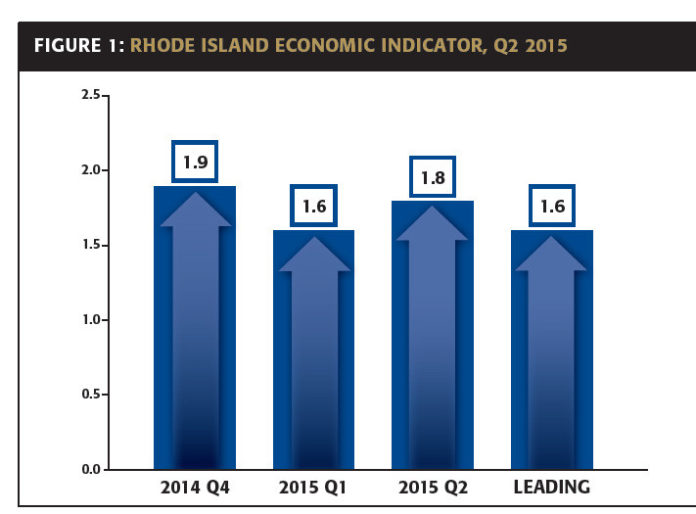
PROVIDENCE – Rhode Island’s economy continued to expand at a slow, but steady, rate in the second quarter, according to the Rhode Island Current Economic Indicator briefing released Wednesday by the Center for Global and Regional Economic Studies and the Rhode Island Public Expenditure Council.
According to the briefing, the state’s economy grew by an annualized rate of 1.8 percent in the second quarter compared with an expansion of 1.6 percent in the first quarter and 1.9 percent in fourth quarter 2014.
RIPEC said Rhode Island’s economy is expected to grow at a 1.6 percent annualized rate in the third quarter, with growth continuing into the fourth quarter.
“Rhode Island’s economy is showing continued signs of slow growth, with certain segments of the labor market performing reasonably well, but with the notable exception of the construction industry,” John C. Simmons, executive director of RIPEC, said in a statement.
Simmons said, “The most concerning aspect of the state’s continued mediocre growth is that Rhode Island is consistently growing at a slower rate than the national and regional economies. This suggests that the state is benefiting from positive trends elsewhere, but is experiencing little growth of its own.”
The Regional Current Economic Indicator said that the New England economy grew at an annualized rate of 2.8 percent in the second quarter, compared with 1.9 percent in the first quarter.
Rhode Island’s economy has grown at a slower rate than the regional economy during the past three quarters, RIPEC said. In addition, the U.S. gross domestic product increased at an annualized rate of 3.9 percent in the second quarter, compared with an increase of 0.6 percent in the first quarter, showing that Rhode Island also lagged the national rate.
RIPEC said the Ocean State’s “modest economic growth” in the second quarter was mostly the result of mixed performance in 11 CEI indicators measuring internal state economic activity.
Of those indicators, several did not experience positive growth: construction employment, trade, transportation, and utilities employment and information services employment.
Construction employment, for example, declined by an annualized rate of 23.5 percent during the second quarter, representing the third quarter out of the last four with job losses in the construction industry.
Financial services employment remained unchanged for the second consecutive quarter, RIPEC said.
Sectors that performed well included manufacturing, where employment increased by an annualized rate of 0.6 percent, continuing a positive job growth trend over the last four quarters. Professional and business services employment increased by an annualized rate of 15.9 percent, reversing a trend of two consecutive negative quarters. Leisure and hospitality employment, and education and health services employment also posted positive job growth during the second quarter, the report said.
“While overall economic growth in Rhode Island remains subpar, the state’s labor market continues to perform reasonably well. … Average weekly initial unemployment claims decreased at an annualized rate of 9.3 percent in the second quarter, suggesting that fewer Rhode Islanders are losing their jobs,” the report said.
Economists at the Center for Global and Regional Economic Studies at Bryant University develop the quarterly CEI.












